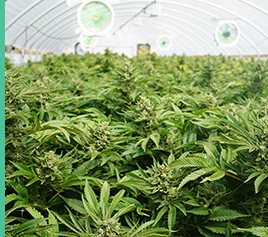Get A Quote
Medical Cannabis expanding in multiple states

Cannabis has steadily become more legalized both commercially and for the medical marketplace as more states adopt their own laws in conflict with Federal regulations. The biggest place where it is still not legalized is in the Southeast where most states have only decriminalized it. With the new legislative sessions beginning two states have advanced medical cannabis bills with tremendous support.
One of these states is South Carolina which is a surprise to many. South Carolina is one of the states that still considers cannabis an illegal drug, whereas almost every state has some form of decriminalization on the books, whether through medical or making it more of a misdemeanor. When the session was opened, the bill was given priority status to be looked over in the state senate, meaning they would be concentrating on it until its either passed or blocked.
The South Carolina Compassion Act would create a well-regulated medical cannabis program to allow seriously ill individuals to use and safely access medical cannabis when recommended by their physicians. The conditions for the bill as it stands are as follows:
- The bill’s qualifying conditions are: cancer; multiple sclerosis; neurological disease or disorder — including epilepsy; sickle cell anemia; autism; chronic pain; glaucoma; PTSD; Crohn’s disease; ulcerative colitis; cachexia or wasting syndrome; severe or persistent nausea; a terminal illness with less than a year to live; a condition causing severe and persistent muscle spasms; or a condition for which opiates are or could be prescribed. Physicians could also recommend medical cannabis for any condition that the physician finds is debilitating to the individual patient that the doctor is qualified to treat.
- The bill would also create a Medical Cannabis Advisory Board, which would consider petitions to add serious conditions to the program.
- If the patient is expected to recover within a year, or no longer needs cannabis, the physician must make a notation, so their ID expires earlier. (1)
State Senator Tom Davis, the sponsor on this bill was enthusiastic that the Senate would be taking this bill up. “I fully expect that, given those commitments, that we’re going to be standing here in three or four months celebrating a bill signing with [Gov. Henry McMaster (R)] to finally make us not one of the 14 states that refuses to acknowledge medicine, but one of the 37 states that has recognized it,” Davis said.(2)
Meanwhile in Mississippi, their bill has passed their House and is expected to pass their Senate either as is or with changes before reaching the governor’s desk. Among the changes from the original law was they decreased the amount allowed to be purchased to three ounces. In addition, House Bill would put the regulatory commission under the State Department of Health not Agriculture. “Under the Senate version, the Department of Agriculture and Commerce would have overseen the licensing, inspection and oversight of cannabis cultivation facilities, processing facilities, transportation and cannabis disposal entities in the state.
Agriculture and Commerce Commissioner Andy Gipson was outspoken about his desire to be left out of any medical marijuana program.
"It's not what my oath of office required, and it's not what the people in Mississippi elected me to do, to be the marijuana kingpin of the state of Mississippi," Gipson said in September. (3)
As a federal cannabis push has seemingly stalled, it is up to the states to put together a viable strategy to handle cannabis. South Carolina and Mississippi are moving forward with their ideas despite some opposition at the state level. As it is still illegal at the federal level, any businesses that work in the field must stay in their state boundaries.

